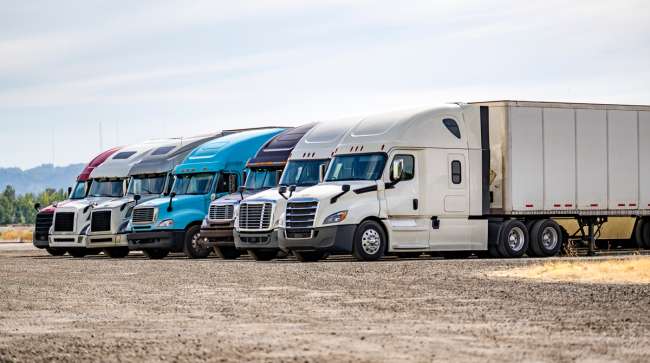As yet, with no timeline announced and no changes to the statute book, OEMs are pressing ahead with pre-existing plans. (vitpho/Getty Images)
Class 8 truck and engine manufacturers remain on schedule to meet upcoming changes to emissions regulations, they say, but are retaining the flexibility to alter their current rollout schedules should the Trump administration carry out proposed rollbacks.
Environmental Protection Agency Administrator Lee Zeldin on March 12 said the Greenhouse Gas Emissions Standards for Heavy-Duty Vehicles would be reconsidered. EPA also said the 2022 Heavy-Duty Nitrous Oxide (NOx) rule would be re-evaluated.
The 2027 NOx standard as it stands at present drops to 35 milligrams per horsepower-hour from 200 mg/horsepower-hour.
Zeldin cited the regulatory and compliance costs plus the impact on the cost of living in the U.S., also arguing “coercive pressure” on truck makers to build zero-emission trucks was “fundamentally distorting the market.”
The announcements were part of a cluster of promised regulatory rollbacks by the Trump administration.

Zeldin has argued against the “coercive pressure” on truck makers to build zero-emission trucks was “fundamentally distorting the market.” (Mark Schiefelbein/Associated Press)
EPA has yet to announce a timeline for the reconsideration of the GHG standards or re-evaluation of the NOx rule. The EPA press office referred Transport Topics to a fact sheet on the potential changes when asked if a timeline was available or when it would be available. Rulemakings typically take two or three years to formulate.
The announcements were welcomed by for-hire carrier industry stakeholders, including American Trucking Associations.
“GHG3 in its current form is unachievable given the state of battery-electric technology and the sheer lack of charging infrastructure. This rule has been an albatross for the trucking industry, threatening to reduce equipment availability, increase costs for businesses and consumers, and cause major supply chain disruptions,” ATA President Chris Spear said.
RELATED: Tariff Variables Muddy Sales Outlook for Truck Makers
And with adoption rates for battery-electric and hydrogen fuel cell electric trucks underwhelming and refueling infrastructure buildout progressing far slower than expected, the top executive at the world’s largest truck maker isn’t displeased with the announcement, despite the company’s own zero-emission vehicle ambitions.
GHG3 being “reconsidered … sounds like that might not come then,” Daimler Truck CEO Karin Radstrom told analysts March 14 on the company’s quarterly earnings call.
“That rule would stipulate that we sell a certain amount of zero-emission trucks. So, I think this would not be bad if that was reconsidered, as the kind of enabling conditions for zero-emission trucks in the U.S. aren’t there right now in terms of cost parity and in terms of infrastructure,” said Radstrom.

Radstrom announces the Mercedes-Benz eActros electric truck at an unveiling in 2022. (Krisztian Bocsi/Bloomberg News)
As yet though, with no timeline announced and no changes to the statute book, OEMs are pressing ahead with pre-existing plans.
“We are committed to adhering to the requirements established by the EPA and will continue to develop our product strategy in alignment with these standards,” a Daimler Truck North America spokesperson told TT in an email.
DTNA — which owns Class 8 truck brands Freightliner and Western Star — sold 40.8% of the new trucks bought in the U.S. in 2024, according to Wards Intelligence data.
“In 2027, DTNA will offer a complete range of EPA-compliant heavy-duty engines, including the Detroit DD13, DD15 and DD16 models. All previously communicated plans remain unchanged,” the spokesperson said in response to TT questions. “DTNA remains committed to providing a robust lineup of engines that meet both GHG and NOx regulations.”
Fellow truck maker Kenworth is maintaining a similar position.
“Kenworth’s product portfolio complies with EPA 2027 Greenhouse Gas Regulations, and our product plans will not change unless regulation law is changed. Knowing the standards are still (by law) slated to change in 2027, our products will meet those standards and will be ready in the event any delays are realized,” Director of Marketing Kyle Kimball told TT in an email.
“That said, and given the time frame needed for powertrain development, we plan for multiple outcomes and are prepared to comply with every regulatory scenario,” Kimball added.
Volvo Group, parent company of Volvo Trucks North America and Mack Trucks, concurred. A spokesperson said the two brands would comply with the requirements of the regulatory landscape.
Cummins, whose engines are options across a number of models at various truck makers, said the Columbus, Ohio-based company would continue to monitor and engage in industry and regulatory activity with EPA.
Investors’ initial expectations are that the fallout will be lower truck sales, according to a research note from Melius Research Founding Partner Rob Wertheimer, with Kenworth and Peterbilt parent company Paccar’s share price decreasing as a result.

Kenworth’s T680 truck. (Colby Williams)
Paccar’s share price closed March 11 at $104.72, and was trading below $99 on March 27, a decrease of more than 5%. Over the same period, the benchmark S&P 500 Index rose about 2.5%.
If the entire emissions standard is scrapped, Wertheimer expects second half of 2025 and 2026 Class 8 sales to fall between 10% and 15% compared with current estimates. And even if the rules remain in place, uncertainty will scotch the expected tractor pre-buy to beat the introduction of the tougher emissions rules.
Top OEM executives were already seeing purchases slipping. Traton Group — parent company of International Motors — is expecting little pre-buy in 2025 even if the existing regulations stay on the books, CEO Christian Levin said during an earnings call just two days before Zeldin’s announcements.
International Motors declined to comment on the potential EPA regulation changes.
Order data for February, meanwhile, illustrates the uncertainty fleet managers are facing. FTR Transportation Intelligence reported North American Class 8 net orders in February totaled 17,000 units, down 31% month over month and 38% year over year, as well as 36.8% below the seven-year February average of 26,912 net orders.






